Diplomatic Bluebook 2018
Chapter 3
Japan's Foreign Policy to Promote National and Global Interests
1 Strategic Communications
(1)Overview
The Government of Japan has been actively communicating Japan's stance and way of thinking on the occasions of daily press conferences, interviews, contributions to the media, and speeches at official visits to foreign countries and international conferences by the Prime Minister, the Foreign Minister, and Government officials. The diplomatic missions overseas have actively communicated to the government of the appointed countries, their citizens, and the media on Japan's fundamental stance and views on a range of issues including the recognition of history or maintenance of territorial integrity. When the media publish reports that include factual errors, the diplomatic missions overseas, especially ambassadors and consuls general, or Press Secretary, explain by sending rebuttal pieces based on objective facts. MOFA also actively engages in communications with the public via social media and websites, in addition to creating publicity materials including videos on Japan's foreign policy.
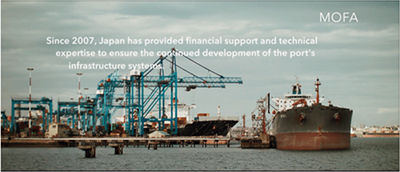 Foreign policy video “Japan's Efforts toward Connecting and Prospering the World for Free and Open Indo-Pacific” (Released on November 9, and broadcast on CNN from November 11 onward. It is viewed at MOFA's YouTube channel.)
Foreign policy video “Japan's Efforts toward Connecting and Prospering the World for Free and Open Indo-Pacific” (Released on November 9, and broadcast on CNN from November 11 onward. It is viewed at MOFA's YouTube channel.)In order to make Japan's fundamental stance on policy issues understood, it is also important to enhance coordinated efforts with experts and think tanks. Based on this recognition, MOFA has invited influential experts and media personnel from around the world, providing them with opportunities to exchange views with Government officials and others, and to visit various places around Japan. Furthermore, Japan has dispatched Japanese experts abroad while extending its support for holding Japan-related seminars.
Moreover, in order to expand the base of deeper understanding and affinity for Japan, including among those who have not had a strong interest in Japan, the following actions are important: (1) providing information on the diverse attractiveness of Japan through “All-Japan” efforts by the Government, private sectors and local governments; (2) promoting outreach that reflects the needs of local communities, utilizing the expertise of experts from both inside and outside Japan; and (3) providing a “one-stop-service” where all information related to Japan can be obtained. With this in mind, “Japan Houses” have been successively established since 2017 in São Paulo (Brazil), Los Angeles (U.S.), and London (UK) as communication hubs to bring about the realization of these actions. (See Column “Japan House -From a Highly Rated Japan, to an Influential Japan-”)
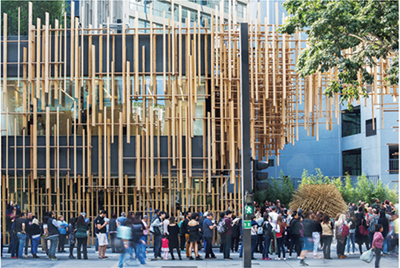 Japan House São Paulo (Photo: Japan House São Paulo Secretariat/Rogerio Cassimiro)
Japan House São Paulo (Photo: Japan House São Paulo Secretariat/Rogerio Cassimiro)(2) Reports by Foreign Media on Japan and Communications through Foreign Media
In 2017, when Japan continued to serve as a non-permanent member of the UN Security Council from 2016, the foreign media paid much attention to Japan's foreign policy including its response to issue of North Korea, security, economics and society, as well as its international cooperation. Moreover, active foreign visits by the Prime Minister and the Foreign Minister, in line with “Japan's foreign policy that takes a panoramic perspective of the world map,” captured the attention of the local media of destination and other international media.
Amidst increasing interest in Japan, MOFA actively provides timely information and offers assistance with press coverage to foreign media in order to gain understanding and support from the international community about Japan's positions and its activities. MOFA makes efforts to achieve strategic and effective communications by providing information to relevant media outlets at the appropriate times.
In terms of communications through foreign media, MOFA conducts press conferences, such as those held by Foreign Minister Kono, and provides information to correspondents in Japan via press releases and other materials. MOFA arranges interviews, press conferences, and op-ed article contributions to foreign media during overseas visits by Prime Minister Abe and Foreign Minister Kono, and their participation in international conferences such as the G7 Taormina Summit, the G20 Hamburg Summit, the TICAD Ministerial Meeting, and the UN General Assembly. In 2017, Prime Minister Abe gave a total of 12 interviews and article contributions, while Foreign Ministers Kishida and Kono gave a total of 21 interviews and article contributions. Prime Minister Abe also conducted four independent press conferences during his visits overseas, and Foreign Minister Kono conducted two press conferences to the foreign press during his visits overseas.
For example, taking the opportunity of his visit to Southeast Asia in January, Prime Minister Abe communicated his messages about the enhancement of bilateral relations with each country, expansion of trade and investment and cooperation in the field of maritime security of the Philippines, Indonesia, and Viet Nam. Prior to his visit to Russia in September, Prime Minister Abe appeared in an interview conducted by a Russian TV station, and spoke about the Joint economic activities on the Four Northern Islands and Japan's resolve to conclude a peace treaty. When attending the UN General Assembly during the same month, he contributed an article to the New York Times (U.S.) about the issues of North Korea. During the visit of U.S. President Trump to Japan in November, Prime Minister Abe accepted an interview with Fox News (U.S.), where he communicated information about cooperation with the U.S. regarding the issues of North Korea, and strengthening Japan-U.S. relations. In August, Foreign Minister Kono took the opportunity of his visit to the U.S. to appeal for further strengthening of the Japan-U.S. Alliance by accepting an interview with the Washington Post. On the occasion of the TICAD Ministerial Meeting the same month, he also accepted an interview with Euronews and Africanews in Mozambique, and introduced Japan's efforts to support Africa. In addition, he appeared in an interview with CNN (U.S.) in November, and spoke about Japan's response to North Korea and the strengthening of the Japan-U.S. relations.
Active efforts were also made by the Press Secretary and others to provide information to the foreign media during overseas visits by the Prime Minister and the Foreign Minister. For example, a total of about 130 people attended the press briefings held during the APEC and ASEAN Summits in November.
In addition, MOFA invited 78 journalists and six TV teams from abroad, with a focus on media outlets with no correspondents in Japan, to provide opportunities for them to enhance their understanding of Japan's priority policies and positions. For example, taking the opportunity of Foreign Minister Kishida's visit to Kumamoto in March for the project of “Local to Global,” a total of 11 journalists from five countries in Asia and six countries in Central and Eastern Europe were invited to Japan, and MOFA provided with the opportunities to cover the current situation of recovery and reconstruction of Kumamoto from the earthquake. As a result, numerous articles were published in various countries about reconstruction efforts made by the local government. In April and November, five journalists from Asia, Europe, and Central and South America visited Iwaki and Soma cities in Fukushima prefecture, given the situation that incorrect information was still widespread in the aftermath of the Great East Japan Earthquake in some countries. Opportunities were also provided for journalists to cover Japan's energy diplomacy and energy-related technologies in October. Five journalists from five countries in Asia, the Middle East, and Africa were invited to cover facilities related to the Fukushima Plan for a New Energy Society, and this was subsequently reported in each country. In December, five journalists were invited from the Arab states and given the opportunities to cover Japan's Middle East policies as well as its cooperative relation with the Middle East.
In some cases where reports on Japan by the foreign media included factual errors, MOFA promptly delivered explanations to the media or sent letters to the editor in order to promote reports based on accurate facts and understanding.
(3) Dissemination of Information through the Internet
MOFA has been actively engaged in disseminating information through the internet, including its website and social media, with the aim of gaining the understanding and support of people in and outside Japan on Japan's foreign policy.
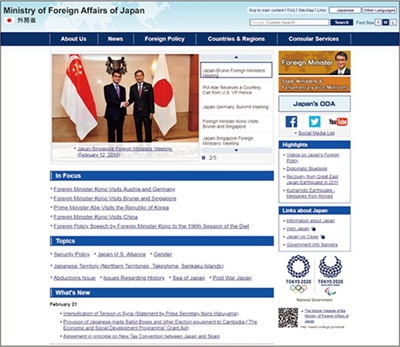 MOFA's official website
MOFA's official websiteMOFA considers its English website an important tool of public diplomacy, and has been enhancing the distribution of information in English on Japan's foreign policy (including territorial issues, historical issues and security), Japan's position on international affairs and Japan's rich and varied attractiveness. Furthermore, MOFA has been making efforts to disseminate information in local languages through the websites of Japan's embassies and consulates-general overseas.
MOFA speedily distributes a wide range of information to the international community speedily through social media platforms such as Facebook, Twitter and YouTube.
The establishment of Japan House (www.japanhouse.jp/) is proceeding in the three cities of London (UK), Los Angeles (U.S.) and São Paulo (Brazil). This is a new hub that aims to spread Japan's diverse points of appeal to the world, based on the concepts of “a surprising, insightful encounter with the authentic stories of Japan” and “a place that opens people's eyes to Japan.”
Japan has an incomparably rich and diverse range of cultures, including cultures and customs rooted in profound spirituality, traditions, and Japan's rich nature and climate, arts that convey a sense of Japan's sensitive and delicate aesthetic, innovative cutting-edge technology, and extreme and penetrating fashion and pop culture. These cultures can carry diplomatic value that can enhance Japan's presence in the international community as well as maintain and strengthen its influence. Japan House offers the opportunity for visitors to “encounter” and experience Japanese culture and arts that touch their hearts and stir their emotions, with the aim of expanding the base of people who take an interest in, and feel affinity and resonate with, Japan and the Japanese people who are producing such culture and arts. Furthermore, it aims to spread the recognition of Japan's value as a global partner that has positive influence on the world.
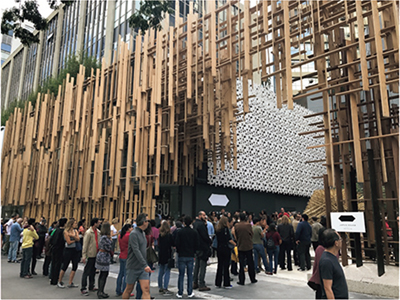 Visitors forming a long queue to enter the Japan House in São Paulo (São Paulo, Brazil)
Visitors forming a long queue to enter the Japan House in São Paulo (São Paulo, Brazil)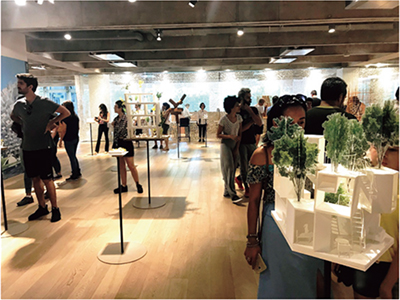 Visitors viewing the exhibition (São Paulo, Brazil)
Visitors viewing the exhibition (São Paulo, Brazil)The Japan House in São Paulo, which opened in April, attracted more than 550,000 visitors from within and outside the country in the eight-month period until the end of December, and has become a new place of interest in São Paulo. In addition to organizing exhibitions at the gallery, this Japan House also operates a restaurant, shop, and café that actively harness the vitality of the private sector and the appeal of the local region. There is also a library where visitors can obtain various information about Japan. Participatory workshops and lectures that are tied in with the exhibitions, as well as campaigns and events organized by the local governments and Japanese companies, are being held in the seminar room.
Japan House aims to support not only artists with an established reputation, but also to serve as a foothold for talented and passionate people such as young artists, local governments, and companies, who express Japan and promote their expression to the world. After São Paulo, the Japan House in Los Angeles, U.S., was also opened partially (gallery and shop) in December. Currently, preparations are underway towards the full opening of the Japan House in Los Angeles, and the opening of the Japan House in London, UK.

